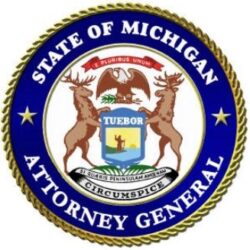
Gov. Whitmer Signs Bills Into Law

FOR IMMEDIATE RELEASE July 8, 2020 Contact: [email protected]
Gov. Whitmer Signs Bills Into Law Governor Whitmer also vetoes certain bills. LANSING, Mich. — Today, Governor Whitmer signed House Bills 4546, 4547, 4389, 4390, and 4217, as well as Senate Bills 254, 248, 850, 696, 585, 517, and 173 into law. The governor signed House Bills 4389 and 4390, which regulate the use and reporting of firefighting foam containing per- and polyfluoroalkyl substances, or PFAS. “Protecting our air, land and Great Lakes and ensuring Michiganders have access to clean, safe drinking water has been a top priority of my administration since day one,” Governor Whitmer said. “By signing these bills into law, we ensure any time a fire department uses firefighting foam that contains PFAS, the state is notified and the foam can be disposed of, so these forever chemicals don’t seep into our drinking water and needlessly harm Michiganders.” House Bill 4389 requires the fire chief of an organized fire department that used firefighting foam containing PFAS to report the incident to the Michigan pollution emergency alert system within 48 hours following an incident. The legislation also makes permanent a program created in 2019 to collect firefighting foam containing PFAS. The bill was sponsored by Representative Sue Allor, R-Wolverine. House Bill 4390 amends the Firefighters Training Council Act and prohibits the use of firefighting foam containing PFAS to be used by anyone trained under the Act. The bill also requires a minimum standard and training for certification as a fire service member using firefighting foam. The bill is sponsored by Rep. Jeff Yaroch, R-Richmond. House Bill 4546 and 4547 expand a program that allows students in high school to dual-enroll in classes in a local community college or career or technical program, by making summer courses eligible for the program. HB 4546 was sponsored by Representative Bronna Kahle, R-Adrian, and HB 4547 was sponsored by Representative Ben Frederick, R-Owosso. House Bill 4217 and Senate Bills 254 and 248 require prescribers to submit prescriptions electronically beginning October 1, 2021, reflecting an analogous federal mandate designed to minimize fraud. HB 4217 was sponsored by Representative Joseph Bellino, R-Monroe, SB 254 was sponsored by Senator Ruth Johnson, R-Holly, and SB 248 was sponsored by Senator Dale Zorn, R-Ida. The bills are tie-barred. Senate Bill 850 creates the Industrial Hemp Growers Act which requires the Michigan Department of Agriculture and Rural Development to develop and operate an industrial hemp program. The bill was sponsored by Senator Dan Lauwers, R-Brockway Township. Senate Bill 696 amends Article 18 (Mortuary Science) of the Occupational Code. Under current law, managers of funeral homes may only manage one home at a time. These amendments would provide a procedure that managers can follow to get approval from the Board of Examiners in Mortuary Science to manage two homes. This bill was sponsored by Senator Rick Outman, R-Six Lakes. Senate Bill 585 designates a portion of Highway US31 in Oceana County beginning at the W. Shelby Road exit 144 and continuing north to the Hart Polk Road exit 149 as the “PFC Brett Witteveen Memorial Highway” in honor of fallen soldier Private First Class Brett Witteveen. The bill was sponsored by Senator Jon Bumstead, R-Newaygo. Senate Bill 517 amends the Michigan Transportation Fund to require the Michigan Department of Transportation to engage an outside consulting firm to conduct a feasibility study on tolling highways. The bill was sponsored by Senator John Bizon, R-Battle Creek. Senate Bill 173 prohibits a wrecker, recovery, or towing service from offering to a local unit of government a payment, fee, or commission to induce the local unit of government to enter into a contract with or secure business for the service. The bill also prohibits local governments from entering into the same contract. The bill was sponsored by Senator Jim Stamas, R-Midland. |






 You have a fire ring, a nearby water source and you checked the weather – now it’s time to enjoy a campfire and a night under the stars! But before you grab the matches, there’s one more thing to consider: what “ingredients” are you putting in your fire?
You have a fire ring, a nearby water source and you checked the weather – now it’s time to enjoy a campfire and a night under the stars! But before you grab the matches, there’s one more thing to consider: what “ingredients” are you putting in your fire?
 The Michigan Natural Resources Commission’s next regular meeting is Thursday, July 16. Due to COVID-19 public health and safety guidelines, the meeting again will be hosted in an online format.
The Michigan Natural Resources Commission’s next regular meeting is Thursday, July 16. Due to COVID-19 public health and safety guidelines, the meeting again will be hosted in an online format.
 State park-inspired apparel, craft beer, coffee, eco-friendly insect repellent and camping gear are just a few products you can purchase (or even rent) to support Michigan’s great outdoors and some small businesses, too.
State park-inspired apparel, craft beer, coffee, eco-friendly insect repellent and camping gear are just a few products you can purchase (or even rent) to support Michigan’s great outdoors and some small businesses, too.
 “This is a really interesting option for us,” said Maia Turek, DNR resource development specialist. “Not only will we receive 10% from Arrive Outdoor rentals, but this also can help new visitors who want to try camping but maybe don’t have the gear because it’s too pricey or they don’t have the room to store it. The other cool advantage is that it gives people a chance to try gear before investing in it.”
“This is a really interesting option for us,” said Maia Turek, DNR resource development specialist. “Not only will we receive 10% from Arrive Outdoor rentals, but this also can help new visitors who want to try camping but maybe don’t have the gear because it’s too pricey or they don’t have the room to store it. The other cool advantage is that it gives people a chance to try gear before investing in it.”